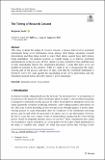Files in this item
The timing of research consent
Item metadata
| dc.contributor.author | Sachs, Benjamin | |
| dc.date.accessioned | 2021-09-29T15:30:08Z | |
| dc.date.available | 2021-09-29T15:30:08Z | |
| dc.date.issued | 2021-09 | |
| dc.identifier | 275347182 | |
| dc.identifier | a28c8e28-e5ab-4004-9032-958e1e6f4f73 | |
| dc.identifier | 85115824929 | |
| dc.identifier | 000702511500001 | |
| dc.identifier.citation | Sachs , B 2021 , ' The timing of research consent ' , Ethical Theory and Moral Practice , vol. 24 , no. 4 , pp. 1033-46 . https://doi.org/10.1007/s10677-021-10224-1 | en |
| dc.identifier.issn | 1386-2820 | |
| dc.identifier.other | ORCID: /0000-0002-2307-7620/work/100901286 | |
| dc.identifier.uri | https://hdl.handle.net/10023/24055 | |
| dc.description.abstract | This essay is about the timing of research consent, a process that involves (potential) participants being given information about, among other things, upcoming research interventions and then being invited to waive their claims against those interventions being undertaken. The standard practice, as regards timing, is as follows: (potential) participants are invited to waive all their claims at a single moment in time, and that point in time immediately follows the information-provision. I argue that there we’re not justified in keeping to this practice. What we ought to do is disaggregate the claim-waiving part of the process and move it later, such that the (potential) participant is invited to waive her claim against the undertaking of any given intervention only the immediate moment before that intervention is to be undertaken. | |
| dc.format.extent | 14 | |
| dc.format.extent | 292727 | |
| dc.language.iso | eng | |
| dc.relation.ispartof | Ethical Theory and Moral Practice | en |
| dc.subject | Informed consent | en |
| dc.subject | Consent form | en |
| dc.subject | BJ Ethics | en |
| dc.subject | T-NDAS | en |
| dc.subject.lcc | BJ | en |
| dc.title | The timing of research consent | en |
| dc.type | Journal article | en |
| dc.contributor.institution | University of St Andrews. Philosophy | en |
| dc.identifier.doi | https://doi.org/10.1007/s10677-021-10224-1 | |
| dc.description.status | Peer reviewed | en |
This item appears in the following Collection(s)
Items in the St Andrews Research Repository are protected by copyright, with all rights reserved, unless otherwise indicated.

